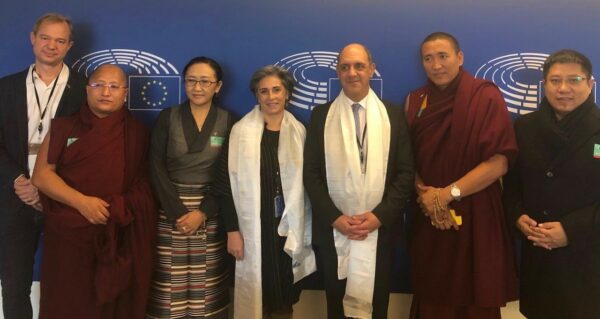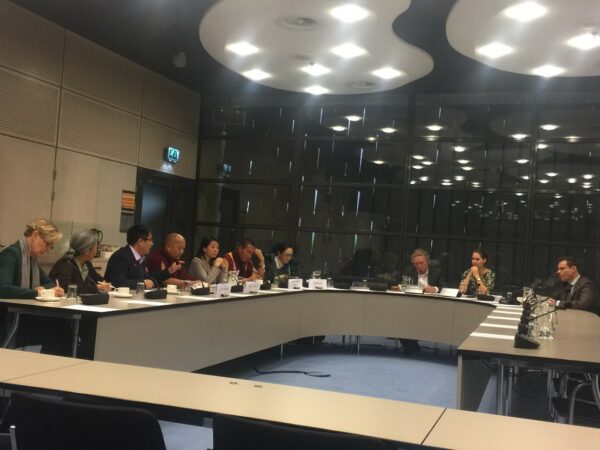A delegation of four members of the 16th Tibetan Parliament in Exile (TPIE) concluded on Nov. 24 a week-long advocacy tour that took them to France, Belgium and the Netherlands.
The visit, which was co-organized by the Office of Tibet in Brussels and the International Campaign for Tibet (ICT), gave the four Tibetan parliamentarians—Tsering Lhamo, head of the delegation, Ven. Kunga Sotop, Lobsang Dakpa and Ven. Gowo Lobsang Pende—the chance to raise awareness of the situation in Tibet and ask for support from the parliaments and governments of the visited countries.

Three main topics
During their visit, the Tibetan parliamentarians met with EU officials, national parliaments and governments, members of local Tibetan communities and civil society groups, focusing on three main topics: the repression against Tibetan Buddhism, namely the control of monasteries, the detention and torture of Tibetan monks and nuns and the succession of the Dalai Lama); the assaults against Tibetan culture and identity, with a special focus on the Tibetan language; and the environmental situation in Tibet , including global warming, Chinese water management policies, threats against the biodiversity on the Tibetan Plateau and the forced settlement of nomads.
In addition, they highlighted the difficulties in getting access to Tibet, in particular for Tibetan citizens of Europe, and called on members of parliaments to adopt legislation similar to the US Reciprocal Access to Tibet Act.
France and Belgium
In France, the Tibetan Parliamentarians exchanged views on the situation in Tibet with members of the French Senate Guillaume Arnell and Maurice Antiste. Arnell, who took part in the conference on reciprocity organized by ICT at the European Parliament in Brussels in 2018, said that as more and more Chinese people are visiting France, it is important that China also guarantees access to Tibet for French visitors. He added that some initiatives would be proposed to the French government on that issue and also stated that the doors of the Senate would remain open to future Tibetan delegations. Senator Antiste said the struggle for Tibet has also to be carried out at the international level, including with other minority groups around the world. The Tibetan delegation was informed that on Oct. 16th, a Chinese delegation on Tibet organized by the Chinese Embassy in Paris met with some members of the Senate Friendship Group on Tibet. The Chinese delegation expressed its views on the situation in Tibet to the French senators, who requested the possibility of sending a delegation to Tibet in order to assess the situation on the ground by themselves, based on the principle of reciprocity; they are now waiting for the Chinese side to assess this request and come back to them.
In Brussels, the Tibetan Parliamentarians met with the Vice-President of the Foreign Affairs Committee of the Belgian Parliament Samuel Cogolati, who expressed strong interest in the environmental situation in Tibet including in regard to the upcoming UN biodiversity conference to be held in China in September 2020. The Tibetan delegation also had the opportunity to meet with members of the European Parliament (MEPs) Isabel Santos, Manuel Pizarro, Martin Horwood, Mikulas Peksa and Fabio Massimo Castaldo. All of them expressed support for improving the situation and the rights of the Tibetan people. On the reincarnation of the Dalai Lama, they clearly stated that it is up to the Tibetan community and the Dalai Lama himself to decide on this important issue. The Tibetan delegation invited the MEPs to visit Dharamsala, the exile home of the Dalai Lama and the Central Tibetan Administration.
The Netherlands
In the Netherlands, the delegation was received by the Foreign Affairs Relations Committee of Parliament. Martijn van Helvert, a Member of Parliament (MP) for the Christian Democrats, a coalition party, told the Tibetan MPs that the Parliament had received a letter from the minister about human rights in China, including policy on Tibet. However, he feels that on some points, the government could do a lot better still. Therefore, there will be a separate debate on the letter of the minister in the near future. He also told the Tibetan delegation that they had received a delegation of the Chinese parliament a week prior and had raised the issue of Tibet as well as freedom of religion and belief. The Chinese delegation had invited the Dutch Parliament to come to China and said they could go wherever they would like to visit. The Tibetan Parliament delegation extended an official invitation to the Dutch Parliament to visit Dharamsala. Bram van Ojik, MP for the Green Left, an opposition Party, expressed appreciation for both invitations and assured the Tibetan delegation that the committee will look into the possibility of visiting Tibet and Dharamsala. He also raised the issue of climate change and environmental degradation in Tibet.

Members of the delegation also met with officials of the Dutch Ministry of Foreign Affairs and apprised them of the destruction of Tibet’s environment, religion and culture under the repressive policies of China. The officials assured their full support for the Tibetans and reiterated that they are concerned about the interference of the Chinese government in religious matters. They confirmed that the succession of the Dalai Lama is a matter for the Tibetans to decide. The officials informed the Tibetan parliamentary delegation that the Dutch human rights ambassador has officially requested to visit Tibet. The ministry is also keenly interested in environmental issues in Tibet.
During their visit, the Tibetan delegation was also received by DWARS, the youth organization of the Green Left Party. The lively meeting was organized by Kunsel Rinchen Dorjee, a young Tibetan born and raised in The Netherlands, who is a member of DWARS.
On the last day of the visit, the parliamentarians visited the Tibetan Gangjong Rigzod Weekend School in Amsterdam and met with the Tibetan community of the Netherlands. The delegation was impressed by the enthusiasm and commitment of both the teachers and the young Tibetan children in learning the Tibetan language in an effort to preserve their culture in the West. Further, the delegation emphasized the importance of active participation by Tibetans in advocacy work for Tibet and raising awareness of the critical situation inside Tibet, followed by a lively and interactive discussion between the parliamentarians and the participants on various subjects pertaining to the Tibetan community in exile.
About the TPIE
The Tibetan Parliament in Exile is the highest legislative body of the Central Tibetan Administration, which was set-up in 1960. The 16th TPIE, elected in 2016, is composed of 45 members: 10 representatives from each of the three traditional provinces of Tibet; two from each of the four schools of Tibetan Buddhism and the pre-Buddhist Bon religion; and two representing each of the Tibetan communities in North America and Europe; plus one from Asia and Australasia (excluding India, Nepal and Bhutan).
ICT quote
ICT Europe Executive Director Tsering Jampa:
“The visit of Tibetan parliamentarians represented a great opportunity
for direct interactions between the Central Tibetan Administration and
national as well as European political institutions. European
interlocutors recognized the urgency of the messages delivered by the
delegation, in particular about the critical human rights situation in
Tibet. The four members were all born and grew up in Tibet and could
therefore provide direct testimonies of their lives in Tibet and the
reasons that pushed them into exile.”